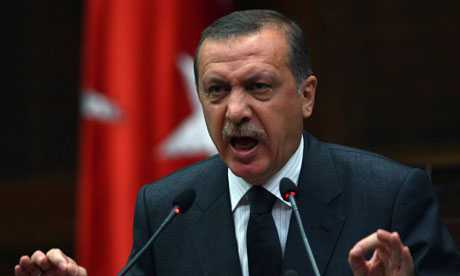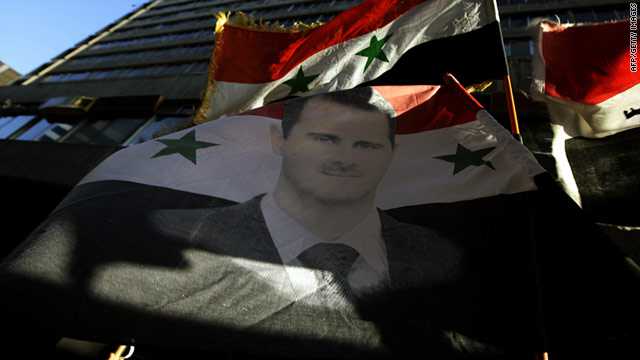By AYLA ALBAYRAK
ISTANBUL—Turkey’s Prime Minister Recep Tayyip Erdoğan said Wednesday that his country would push ahead with planned sanctions on Syria, despite the veto of a United Nations Security Council condemning the regime in Damascus a day earlier.
Mr. Erdoğan’s comments, made while on a visit to South Africa, came as Turkey’s military said it was beginning a routine military exercise close to Syria’s border that would run from Wednesday until Oct. 13.
“The veto of (the draft) will not prevent our sanctions, just as it does not prevent the steps of some or all EU countries,” Mr. Erdoğan said, according to Anadolu Ajansi, Turkey’s state news agency.
Russia and China vetoed the Security Council resolution, which would have condemned the actions of the Syrian regime in killing an estimated 3,000 protesters since the Spring. Russia said it feared the resolution could push Syria towards all-out civil war.
“We will now inevitably apply our sanction package … We have a 910-kilometer long border. Moreover, we have cross-border family ties, which increase our responsibility,” he said.
Mr. Erdoğan didn’t give details of what the sanctions package would entail. He had said Tuesday that he would reveal those when he visits camps for some 7,500 Syrian refugees who have fled violence in the country, just on the Turkish side of the border, either this weekend or next week.
Mr. Erdogan also lashed out at Israel in his speech, repeating previous claims that it a threat to peace in the Middle East. “At the moment I see Israel also a threat to its region and its environment, because it has an atomic bomb,” Mr. Erdogan said, according to Anadolu Ajansi.
Regional Upheaval
Track events day by day in the region.
View Interactive
Turkish officials feel under pressure to act, given the lack of further options available to governments in the U.S. and Europe. Ankara is enforcing an arms embargo, but has been reluctant to impose economic sanctions that might harm primarily Turkish and Syrian businessmen, rather than the regime of President Bashar al-Assad. Turkey exported $1 billion of goods to Syria in the first six months of the year, slightly up from the year-earlier period despite the turmoil, according to figures from the Turkish Exporters’ Assembly.
Turkey’s government had exceptionally warm relations with the Assad regime—the Erdoğan and Assad families even went on vacation together in 2008—but relations turned sour this year when Mr. Assad ignored Turkish pressure to end the crackdown on opponents and institute changes.
The moves came as Col. Riad al As’ad, a former Syrian military officer, reported to have been detained by Turkey and handed over to Damascus, surfaced in Turkey and denied the reports.
Col. As’ad, who defected and fled to Turkey about three months ago, leads Syria’s main military defectors group, the Free Syrian Army, after merging it with another dissident army group last month, said Omar Idlibi, a spokesperson for the Local Coordination Committees, an activist network.
Col. As’ad combined his group with the Free Officers Movement, led by Col. Hussein Harmoush and based in Turkey along the Syrian border. That group was dealt a serious setback in September when Col. Harmoush appeared on Syrian state television, appearing to confess that his movement didn’t actually exist.
Activists say they believe he was either tricked back into Syria by covert intelligence officers, where he was captured by forces there, or handed over by Turkish authorities.
“We did not hand over anyone,” said a spokesman for the Turkish foreign ministry. He said the rumors had begun in the Syrian press when Col. As’ad became ill and was taken by ambulance from his refugee camp to a hospital, accompanied by Turkish health officials.
Col. As’ad said Tuesday that he was living unmolested in Turkey, Anadolu reported. “Turkish authorities have not applied any pressure or violence on us,” he said.
Army defectors have multiplied in recent weeks and are increasingly claiming responsibility for attacks on security forces. Last week, activists said defectors in al-Rastan, a town north of Homs, destroyed about a dozen tanks. Dissident soldiers, mostly low-ranking Sunni conscripts, say they are keeping their light weapons with them and urging other soldiers to defect to protect civilians. There haven’t yet been any announced defections from higher-ranking Alawite soldiers, who form the military’s backbone and are Assad loyalists.
—Nour Malas in Dubai and Marc Champion in Istanbul contributed to this article.
via Turkey to Place Sanctions on Syria – WSJ.com.




